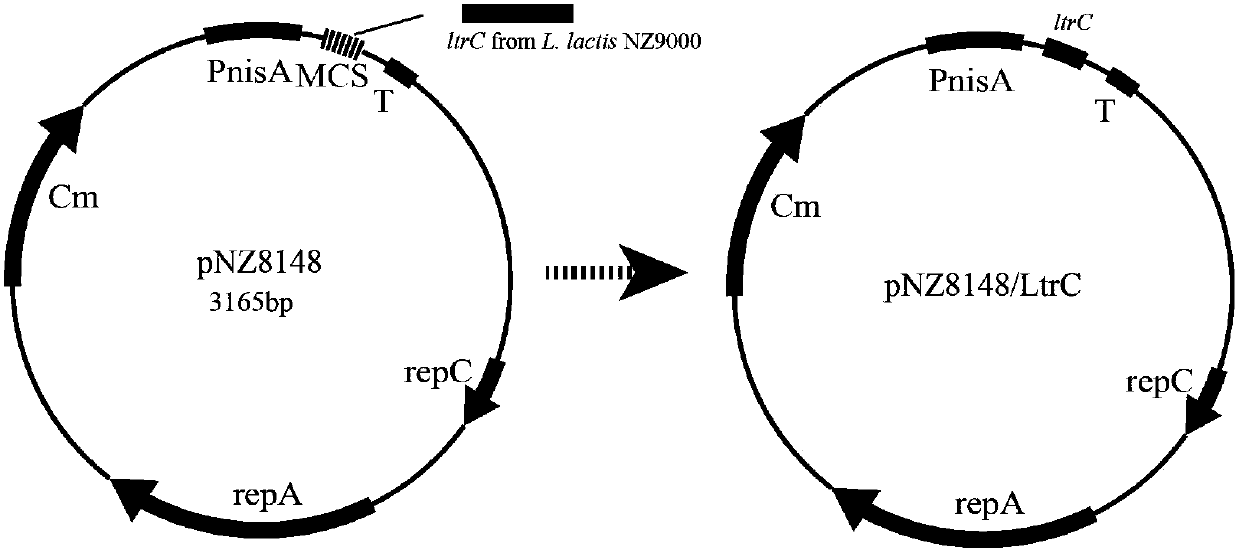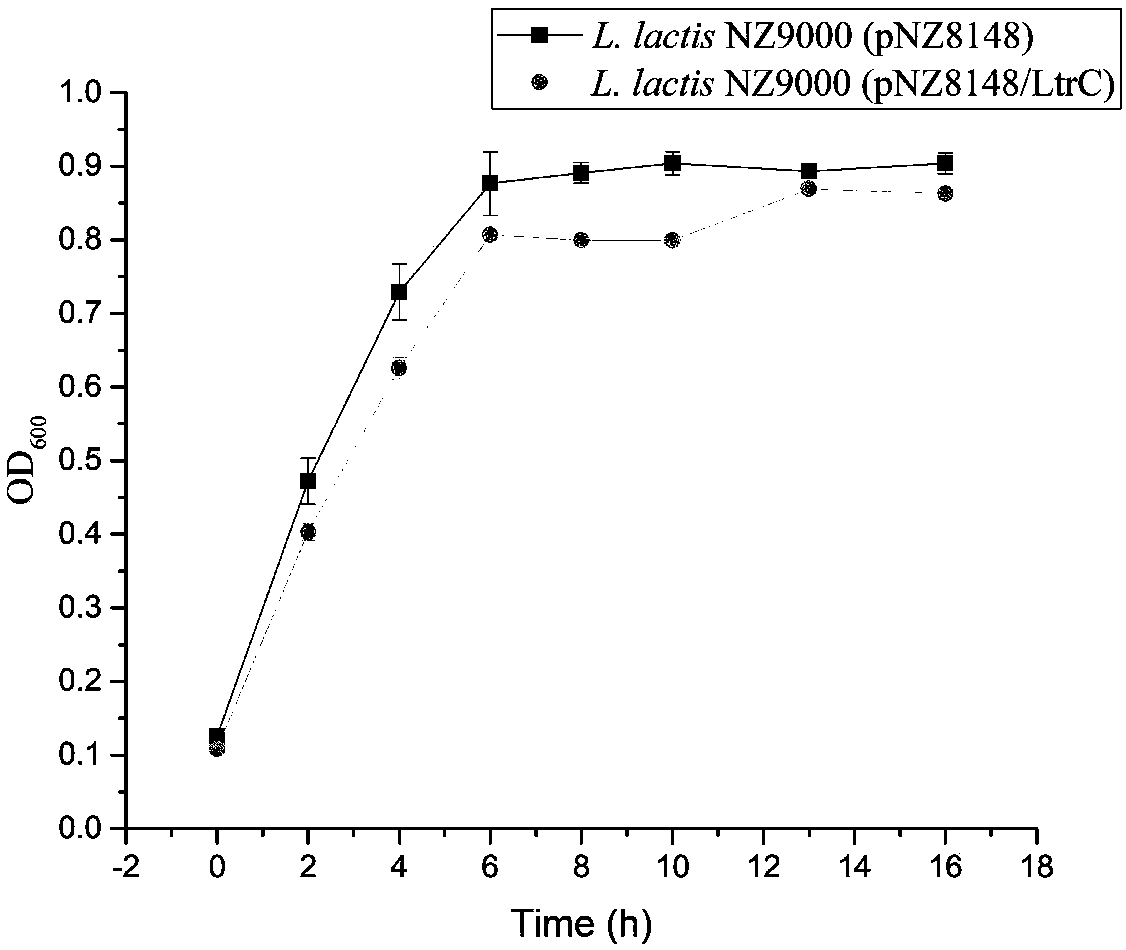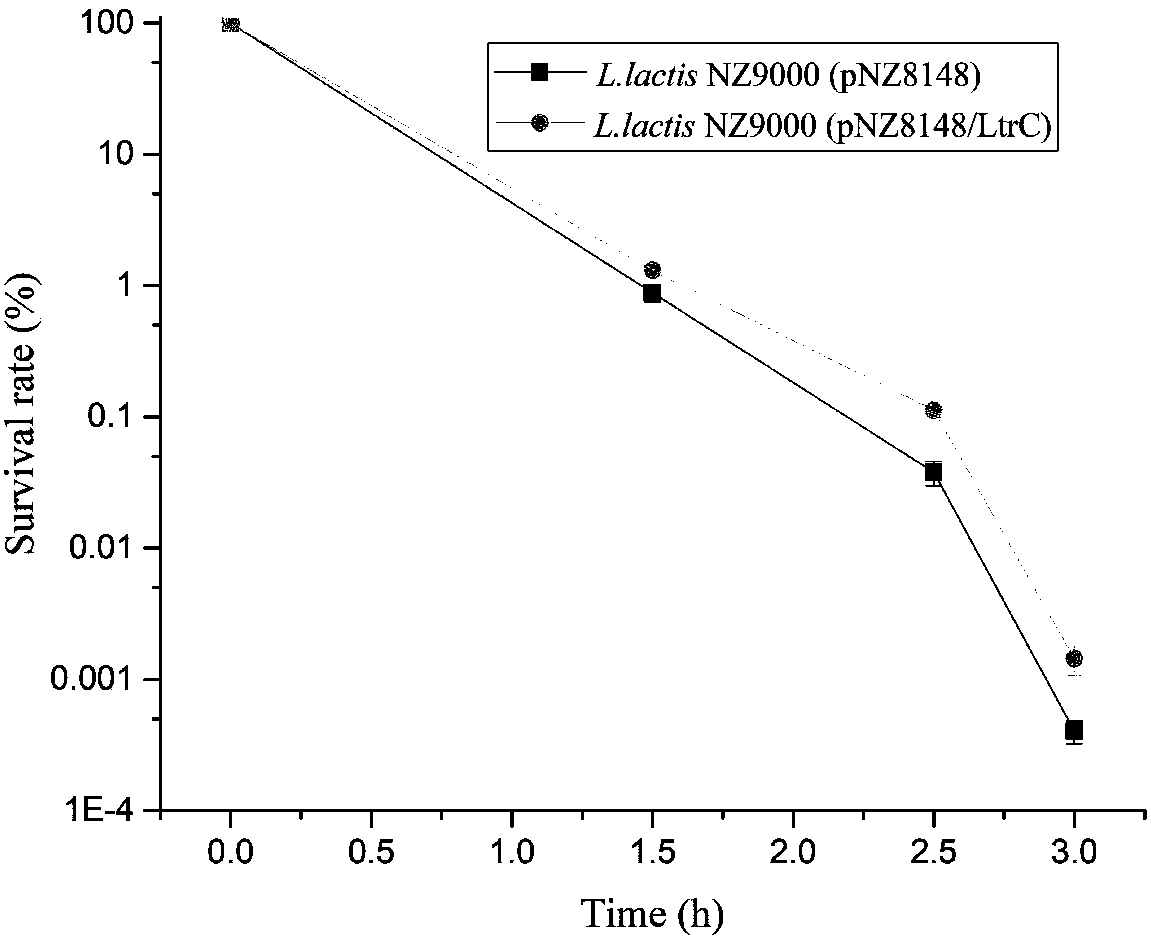Acid stress resistant recombinant lactic acid bacteria and construction method thereof
A technology for recombining lactic acid bacteria and Lactococcus lactis, applied in the field of bioengineering, can solve problems such as low success rate, heavy workload, and low efficiency
- Summary
- Abstract
- Description
- Claims
- Application Information
AI Technical Summary
Problems solved by technology
Method used
Image
Examples
Embodiment 1
[0024] Construction of embodiment 1 recombinant strain
[0025] The gene sequence of LtrC as shown in SEQ ID NO.2 was obtained from L.lactis NZ9000 of the NCBI database, and cloned into the Lactococcus lactis expression plasmid pNZ8148 to obtain the recombinant plasmid pNZ8148 / LtrC, and then electroporated into From the host strain L. lactis NZ9000, a recombinant strain L. lactis NZ9000 (pNZ8148 / LtrC) was obtained.
[0026] details as follows:
[0027] According to the gene sequence of LtrC, primers lrC-F and lrC-R (table 1) shown in SEQ ID NO.3 and SEQ ID NO.4 were designed respectively, and the genome of L.lactis NZ9000 was used as template PCR amplification to obtain SEQ ID NO. The gene fragment shown in ID NO.2. The PCR product and the vector pNZ8148 were double-digested with Nco I and Hind III, respectively, and the digested products were purified and ligated. The ligation product was transformed into Escherichia coli MC1061 (commercial strain) competent, positive clon...
Embodiment 2
[0031] The growth performance test of embodiment 2 overexpression LtrC bacterial strain
[0032] To investigate the growth of bacterial strains when overexpressing LtrC, bacterial strains L.lactis NZ9000 (pNZ8148 / LtrC) and L.lactis NZ9000 (pNZ8148) (control) were inoculated in GM17 liquid medium added with 10 μg / mL chloramphenicol ( 1 mL) for activation, and placed in a 30°C incubator for static culture overnight. The seed solution was then transferred to fresh chloramphenicol (10 μg / mL) GM17 liquid medium with a 2% inoculation amount, and cultured statically at 30°C. Samples were taken every 2 hours, and the OD value at a wavelength of 600nm was measured. Grow to OD 600 At 0.4, 10ng / mL nisin was added to induce the expression of LtrC protein. Taking time as the abscissa, OD 600 The value is the vertical axis, and the growth curve is drawn.
[0033] The result is as figure 2 shown. The growth performance test analysis showed that the biomass of the recombinant strain w...
Embodiment 3
[0034] Tolerance test under the acid stress condition of embodiment 3
[0035] For the analysis of the tolerance of the investigated strains to acid, the survival rates of the recombinant strains and the control strains at pH 4.0 were measured.
[0036] The specific operation method is as follows: the strain was induced and cultured for 6 h, the cells were collected by centrifugation, washed twice with 0.85% normal saline, and then resuspended in an equal volume of fresh GM17 (containing 10 μg / mL chloramphenicol) at pH 4.0 (adjusted by lactic acid). ), the coercion time is different. After the stress, the bacterial suspension was washed twice and resuspended in an equal volume of normal saline, and 10 μL of the resuspension was taken, diluted with different gradients and planted on a GM17 chloramphenicol plate to determine the number of viable bacteria and the survival rate.
[0037] According to the analysis of the tolerance test, the survival rate of the recombinant strain ...
PUM
 Login to View More
Login to View More Abstract
Description
Claims
Application Information
 Login to View More
Login to View More - R&D
- Intellectual Property
- Life Sciences
- Materials
- Tech Scout
- Unparalleled Data Quality
- Higher Quality Content
- 60% Fewer Hallucinations
Browse by: Latest US Patents, China's latest patents, Technical Efficacy Thesaurus, Application Domain, Technology Topic, Popular Technical Reports.
© 2025 PatSnap. All rights reserved.Legal|Privacy policy|Modern Slavery Act Transparency Statement|Sitemap|About US| Contact US: help@patsnap.com



